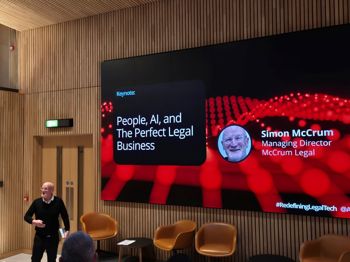
Why did you write The Perfect Legal Business trilogy? What were you trying to address?
"I was keen to show that there are a limited number of key dials that need turning in a law firm to make it sustainably successful, not the hundreds we all chase every day. But the trick is to turn the right dials, in the right direction, at the same time."
Too many firms confuse busyness with progress. McCrum’s trilogy breaks down the ecosystem of firm performance into what he calls “non-negotiable fundamentals”—leadership, culture, supervision, and cash flow.
In The Perfect Partner, you discuss the distinction between management and leadership. How can partners evolve from managers to true leaders within their firms?
"The first step is they need to stop thinking that they are good leaders and they need to develop a hunger to explore what a good leader is and how they can become one. And Senior Management need to put leadership behaviours above a partner’s billing prowess."
You also stress the importance of a shared vision and unified direction. What does that look like in the day-to-day reality of a law firm?
"It is often talked about but usually ignored—it’s all about leadership, and leading in a certain direction. Success or failure depends on a firm getting its partners to lead, to lead together, and to lead the firm to a particular place."
For McCrum, vision is not a mission statement on the website. It’s a practical organising force. In firms that work, partners make aligned decisions, avoid internal drift, and drive toward a clearly defined goal. That level of cohesion only exists when the destination is shared—and actively pursued by everyone at the top.
You argue cash flow is more important than billing. Why is that a blind spot for firms?
"As a sector, we’re obsessed with showbiz—awards, turnover, recruits, soundbites. But behind the scenes, cash is bleeding out. The focus shouldn’t be billing. It should be cash generation."
McCrum doesn’t mince words: law firms that conflate billing with success are putting themselves at risk. He warns that many firms look profitable on paper while quietly suffocating under poor cash flow.
Your 28-point checklist for firm success is widely cited. What do most firms still get wrong?
"Even if they embrace everything on the list, they don’t stick with it. We’re constantly distracted by the next big idea. The keys to success are boring. But sticking with them produces exciting results."
Consistency beats innovation. Firms that build discipline into their operations, rather than chasing shiny objects, see compounding returns over time.
Let’s talk about culture. You advocate for a culture of ‘good people only’ and warn against the dangers of ‘well-poisoners.’ How should firms deal with people who undermine team cohesion?
"They need to lead by example, and there can’t be one rule for the firm and one rule for the partners. There need to be performance and behaviour red lines that can’t be crossed—by anyone. And when those red lines are crossed, leaders have to act. Everyone already knows who the well-poisoners are. Team leaders need to call them out, give them a chance, and then address it if the poor behaviours continue."
McCrum makes it clear: culture is not a brand value, it is a leadership choice. Tolerating destructive individuals, especially high performers who break the rules, undermines everything a firm claims to stand for. The moment the exceptions start, the culture erodes.
What’s your advice for firms facing pressure from legal tech and disruption?
"Law firms can still thrive, but they must use new technologies to deliver consistency. That’s where the opportunity lies."
He’s not anti-tech, but he’s wary of firms chasing tools without first fixing broken systems. Tech, in McCrum’s view, should enhance discipline, not distract from it.
Reflecting on your own journey, what were some pivotal moments that shaped your perspective on law firm management?
"Four moments stand out. First, being hugely busy and ‘successful’ but having no cash. Second, dealing with numerous negligence claims at once because we hadn’t raised the bar in supervision, staff quality, or case selection. Third, how fast a downward spiral can become an upward one. And fourth, how fast an upward spiral can go the other way. These experiences changed everything for me."
These aren’t abstract lessons—they’re scars. McCrum’s philosophy wasn’t built in theory; it was forged through mistakes, pressure, and recovery.
What advice would you give to aspiring lawyers and future partners navigating today’s legal world?
"Be nice, polite, and decent—to everyone, all the time. There’s not enough of it in the profession, and it works wonders."
For all the emphasis on leadership, systems, and strategy, McCrum ends with something simpler: decency. In his view, it’s the most underrated driver of long-term success.
The real next step for UK law firm leaders
If McCrum’s story proves anything, it’s that sustainable success is not about charisma, disruption, or headline wins. It’s about getting the basics right—then sticking with them when everyone else moves on.
His 28-point checklist isn’t just a framework, it’s the pieces of a jigsaw that make up The Perfect Legal Business, the title of his first book.
So, gather your leadership team. Ask the uncomfortable questions. Use the checklist. And if you're serious about change, stop admiring good advice and start acting on it.
Explore how our legal tech supports sustainable firm growth
At Access Legal, we help law firms turn insight into action—whether that’s improving cash visibility, embedding consistent processes, or supporting leadership with the right data at the right time.

 AU & NZ
AU & NZ
 SG
SG
 MY
MY
 US
US
 IE
IE